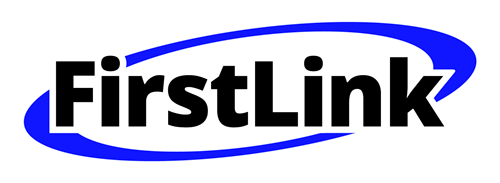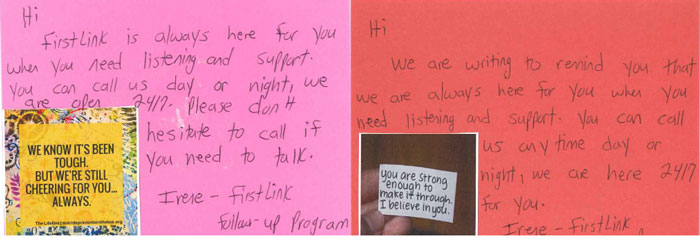FirstLink Care and Support Program
- Need: To reduce suicide and substance-related deaths in North Dakota and Minnesota.
- Intervention: The Care and Support program provides support through phone calls, cards, and texting to those who have called suicide helplines or were referred by a healthcare provider.
- Results: In 2024, FirstLink sent 2,870 cards and texts to program participants and made 12,378 total contacts.
Description
FirstLink, a nonprofit organization located in Fargo, North Dakota, is working to prevent suicides in North Dakota and northwestern Minnesota. FirstLink is the designated 211 provider for the service area. Its Call Specialists answer calls 24/7 and provide confidential listening and information about community resources like financial assistance and support groups. FirstLink also answers the national 988 Suicide and Crisis Lifeline.

FirstLink also offers the Care and Support program, in which individuals who 1) are identified as moderate- to high-risk for suicide, 2) are seeking drug or alcohol treatment, or 3) are experiencing any general mental health crisis can receive additional support and be connected with available resources. Participants may be referred from partnering clinics and hospitals or when they call 211 or 988. Twenty-nine organizations and healthcare facilities partner with FirstLink for care and support follow-up.
In 2016, FirstLink was awarded a SAMHSA Suicide Prevention Lifeline Crisis Center Follow-Up Grant. This grant was used to provide follow-up services to those at-risk individuals within 24 hours of being discharged from Altru Hospital in Grand Forks, North Dakota, and to study further the benefits of follow-up services. When the SAMHSA grant ended, FirstLink continued the program with help from the North Dakota Department of Human Services and secured additional funding from the following healthcare agencies in the region to sustain the program:
- Essentia Health
- Prairie St. John's
- Sanford Health
- Altru
Services offered
The Care and Support program is available to those 14 years old or older who 1) have expressed suicidal ideation in the last 24 to 48 hours, 2) are seeking treatment for substance use, or 3) are experiencing any general mental health crisis. Those younger than 14 can join the program with a parent's or guardian's permission. These individuals may have called the 988 Suicide and Crisis Lifeline (answered by FirstLink) or the 211 helpline, or they may have been referred to FirstLink by one of 29 participating organizations and healthcare facilities.
These at-risk individuals are given the option to participate in the Care and Support program and receive:
- An initial call from the FirstLink Suicide Support Team within 24 hours or one business day of referral
- Handwritten caring letter(s), which lists helpline numbers
- Seasonal cards
- Ongoing follow-up calls as requested or as need determines
Call Specialists provide the following services through these phone calls:
- Assess adherence to aftercare and provide ongoing assessment of risk
- De-escalate situations and provide crisis intervention when appropriate
- Offer resources and warm referral for treatment
- Provide nonjudgmental listening and empower self-advocacy
- Help participants develop a crisis management/safety plan
Results
The FirstLink 2024 Annual Impact Report (found on the FirstLink website's Communications page) lists the following statistics about the Care and Support program:
- 2,041 referrals to the program
- 815 people accepted follow-up services
- 2,870 caring cards and texts sent to participants
- 12,378 total contacts
Below are FirstLink's statistics for general services provided in 2024:
- Handled a total of 86,997 contacts
- Offered 43,814 resource referrals
- Held 108 trainings
Callers' top three needs or concerns in 2024 were rent payment assistance, electric service payment assistance, and rental deposit assistance.
Challenges
One barrier is maintaining funding after a grant has ended in order to sustain the program. Another barrier is change in staff at healthcare facilities. FirstLink works to continue ongoing communication with healthcare facilities so they have the knowledge to refer participants to the program.

Replication
Start by setting guidelines for enrollment criteria and then train crisis center staff on how to recognize and refer callers to the Care and Support program. Ongoing training is essential for the staff making the calls and those making the referrals. Start small; once the staff is comfortable with procedures and enrollment criteria, expand the program.
Staff making contacts have a human services background and are trained in ASIST (Applied Suicide Intervention Skills Training) and Mental Health First Aid. Facilities should follow best practices and procedures. FirstLink is accredited by the American Association of Suicidology and Inform USA. Facilities should have the capability to link the contact to resources in the community to provide multiple levels of care.
Engage healthcare facilities so that they are invested in partnering to screen patients for suicidal ideation and refer appropriate patients to the program:
- Find out who has the power to decide on a partnership
- Talk to the staff working with direct patient care
- Connect with hospital administrators
- Talk to nursing and social work staff
- Be persistent; if your first contact is not interested, talk to someone else
Once the connection is made, establish a designated contact person. Train hospital staff on the benefits of this program, have regular meetings and phone calls with healthcare staff, and provide materials like handouts and posters.
Contact Information
Jennifer Illich, Executive DirectorFirstLink
FirstLink Care and Support Program
701.293.6462
jenniferi@myfirstlink.org
Topics
Suicide and suicide prevention
States served
Minnesota, North Dakota
Date added
July 5, 2017
Suggested citation: Rural Health Information Hub, 2025 . FirstLink Care and Support Program [online]. Rural Health Information Hub. Available at: https://www.ruralhealthinfo.org/project-examples/961 [Accessed 20 February 2026]
Please contact the models and innovations contact directly for the most complete and current information about this program. Summaries of models and innovations are provided by RHIhub for your convenience. The programs described are not endorsed by RHIhub or by the Federal Office of Rural Health Policy. Each rural community should consider whether a particular project or approach is a good match for their community’s needs and capacity. While it is sometimes possible to adapt program components to match your resources, keep in mind that changes to the program design may impact results.
